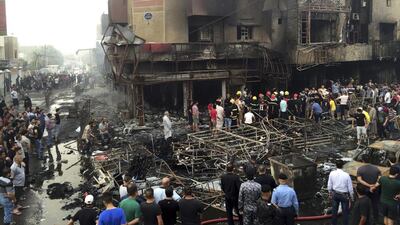BAGHDAD // The death toll from a horror blast early yesterday in the Iraqi capital has risen to 115, with more expected, in an attack claimed by ISIL.
Shortly after midnight a suicide bomber drove a lorry filled with explosives into the Karrada district, which was packed with shoppers preparing for this week’s Eid Al Fitr holidays.
The blast also wounded 187 people, and 12 people were still missing late last night.
The dead included at least 15 children, 10 women and six policemen. Many burnt to death or suffocated, police said.
It was the deadliest attack in the Iraqi capital for a year and among the worst single bombings in more than decade of conflict.
Sheikh Abdullah bin Zayed, Minister of Foreign Affairs and International Cooperation, expressed his condemnation of the terrorist act and offered his sympathy to the families of those killed and wounded.
Sheikh Abdullah called for international efforts to counter violence and terrorism in all its forms.
The blast shattered a peaceful scene, with couples and families strolling through the shops and the mall, or relaxing in restaurants and cafes on the last Sunday before Eid.
“It was like an earthquake,” said Karim Sami, 35, a street seller and father of three. “I wrapped up my goods and was heading home when I saw a fireball with a thunderous bombing.
“I was so scared to go back and started to make phone calls to my friends, but none answered.”
Mr Sami later learnt that one of his friends was dead, another wounded and a third missing.
The blast set buildings ablaze and firemen were still trying to extinguish the flames 12 hours later. Civilians worked with them to carry away bodies wrapped in blankets and sheets.
Smoke billowed from the shopping centre, which was surrounded by the twisted and burnt wreckage of cars and market stalls. A group of women sat on the pavement weeping.
Crowds watched as men carried the bodies of two victims out of one burning building and others cleared rubble in the search for more victims, whether living or dead.
Hussein Ali, 24, a former soldier, said six workers at his family’s shop were killed in the attack, their bodies burnt so badly that they could not be identified.
“I will return to the battlefront. At least there I know the enemy so I can fight him. Here I don’t know who I’m fighting,” he said.
Hours after the Baghdad bombing, Iraqi prime minister Haider Al Abadi visited the blast site with other politicians. An angry crowd shouted “thief” at Mr Al Abadi and his entourage, and pelted the group’s cars with rocks, shoes and jerry cans.
Iraqi forces last week declared Fallujah “fully liberated.” The city, less than an hour’s drive from Baghdad, had been the first Iraqi urban centre to fall to ISIL, in January 2014, and was its last major base in the Sunni Anbar province.
The successful Fallujah campaign had given the prime minister a rare boost after months of anti-government protests over political gridlock, official corruption and poor public services.
But his triumph was short-lived. In Karrada yesterday he faced catcalls and curses over lax security in Baghdad where the guards at checkpoints still use bomb detectors that were shown to be useless years after the man who sold them to Iraq was jailed or fraud in Britain.
“We are in a state of war and these places are targeted. The security can’t focus on the war and forget Baghdad,” Mr Sami said.
Jan Kubis, the UN envoy for Iraq, called the Karrada attack “a cowardly and heinous act of unparalleled proportions” by ISIL seeking revenge for its battlefront defeats.
He urged the Iraqi government to redouble efforts to protect Iraqis during the Eid celebrations.
The White House said such attacks only strengthened America’s resolve “to support Iraqi security forces as they continue to take back territory from ISIL, just as we continue to intensify our efforts to root out ISIL’s terrorist network and leaders”.
Elsewhere in Baghdad, a roadside bomb went off in the mostly Shiite neighbourhood of Shaab, killing five people and wounding 16. There was no claim of responsibility but the attack bore the hallmarks of ISIL.
The Sunni extremists frequently target Iraq’s Shiite majority, who they regard as heretics deserving of death.
Also yesterday, the Joint Military Operation Command announced that government forces had recaptured seven villages south of Mosul, Iraq’s second-largest city, which fell to ISIL in the summer of 2014 when the extremists swept across northern and western Iraq.
It is the last city in ISIL’s self-styled caliphate.
Iraqi forces are clearing areas around Mosul to cut off ISIL’s supply lines and clear the path for reinforcements in preparation for a much bigger offensive.
At the height of its powers in 2014, ISIL had wrested nearly a third of Iraq away from government control. According to Mr Al Abadi’s office, only 14 per cent of Iraqi territory remained in the hands of the fanatics.
* Associated Press

